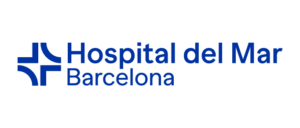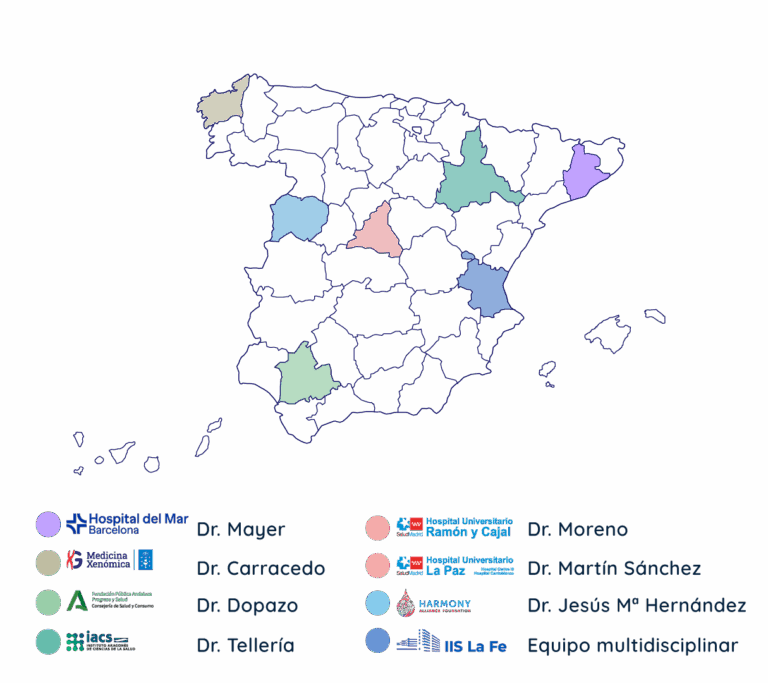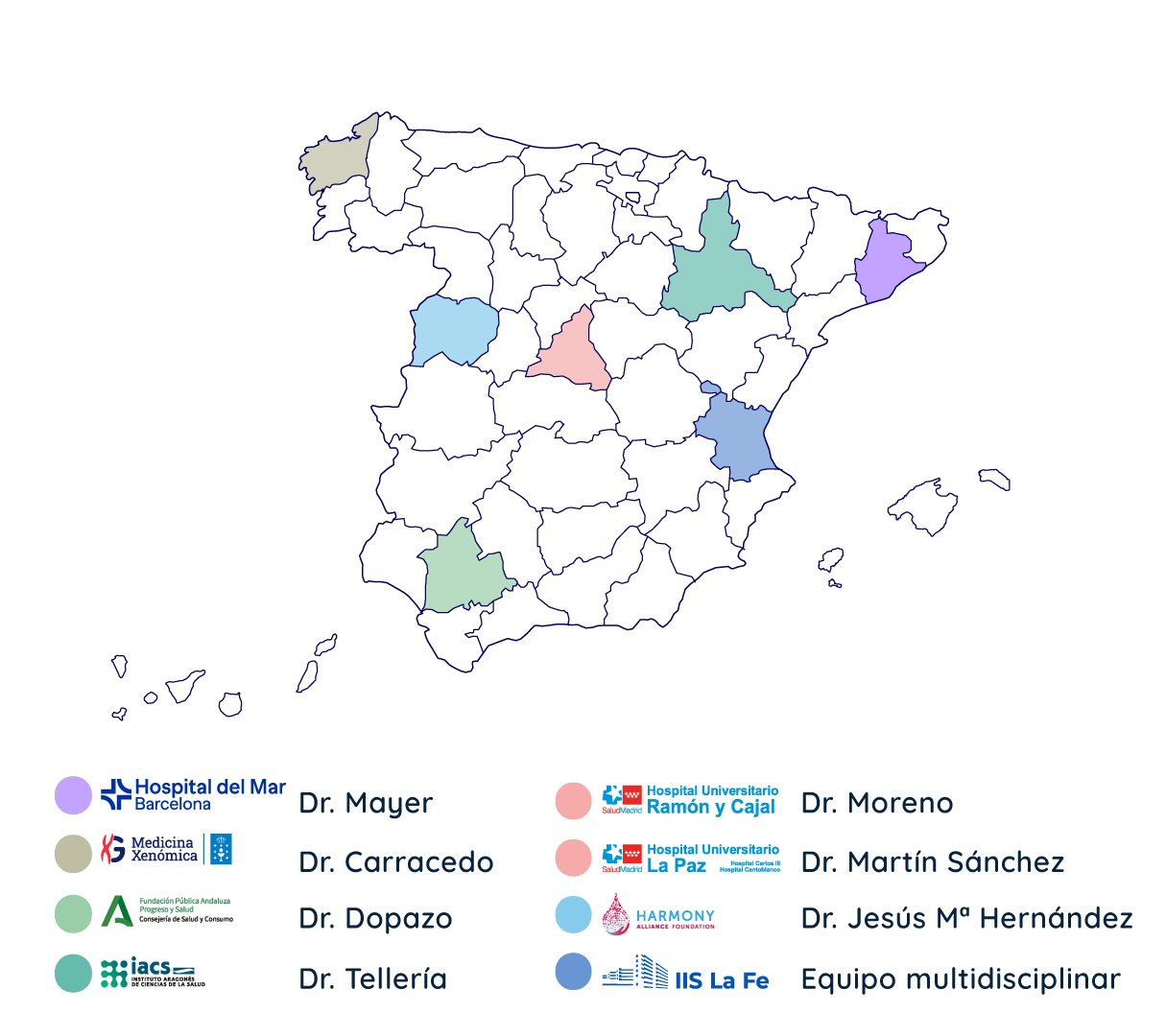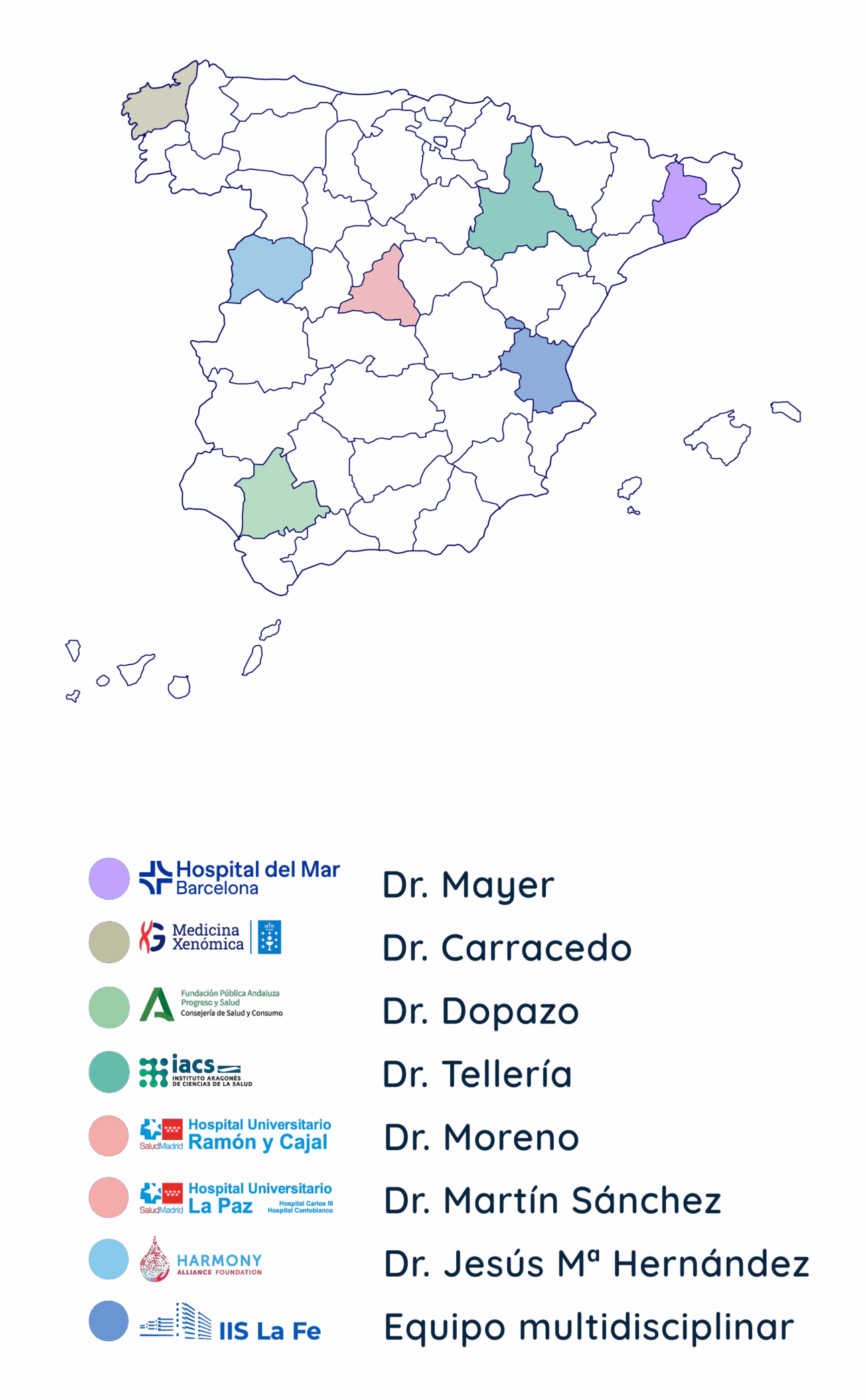What Are Data Spaces?
Data Space
A Data Space is a secure and regulated environment where organizations can share and access data in a controlled way. Its purpose is to enable data exchange without compromising privacy, security, or intellectual property rights.
Regulatory Framework
Exchange
Collaboration
Who Are the Participants in This Data Space?
Health Research Institute La Fe (IIS La Fe)

The Health Research Institute La Fe (IIS La Fe) is a biomedical research entity established through the collaboration of the La Fe University and Polytechnic Hospital, the University of Valencia, the Polytechnic University of Valencia, the Research Foundation of the La Fe University Hospital of the Valencian Community, and the IIS Foundation.
Aragonese Institute of Health Sciences (IACS)

The Aragonese Institute of Health Sciences (IACS) is the institution responsible for advancing biomedical and health sciences knowledge in the region of Aragón. It was established under Law 6/2002 of April 15 on Health in Aragón, which defines IACS as a public law entity attached to the regional Department of Health, with its own legal personality and assets.
Dr. Carlos Tellería
University of Santiago de Compostela – Genomic Medicine Group

The Galician Public Foundation for Genomic Medicine is a leading center in genomic research and clinical genetics. Its greatest asset is the expertise of its professionals, trained in prestigious institutions and actively involved in international research networks.
The foundation currently includes over 75 members and is coordinated by Dr. Ángel Carracedo. It is organized into four main areas: Forensic Genetics, Medical Genetics, Evolutionary Genetics, and Services, – each comprising laboratories aligned with the group’s core research lines and activities.
Dr. Ángel Carracedo, Dr. Mª José Brión
La Paz University Hospital Health Research Institute (IdiPAZ)

IdiPAZ is a multidisciplinary and translational biomedical research space focused on basic, clinical, epidemiological, and health services research. It is the result of collaboration between La Paz University Hospital (HULP), the Autonomous University of Madrid (UAM), Getafe University Hospital (HUG), the European University (EU), and the Biomedical Research Foundation of La Paz University Hospital (FIBHULP).
Dr. Fernando Martín Sánchez
Ramón y Cajal University Hospital

The Biomedical Research Foundation of Ramón y Cajal University Hospital (FIBioHRC) was formally established in 2003, authorized by the Regional Government of Madrid through Decree 187/2003 of July 24, under the Foundations Law 1/1998 of March 2 of the Community of Madrid.
Dr. MIguel Ángel Moreno
Hospital del Mar Research Institute

The Hospital del Mar Research Institute brings together over 700 professionals. It brings together researchers from the institute, clinical staff from Hospital del Mar, and collaborators from Pompeu Fabra University (UPF), Autonomous University of Barcelona (UAB), and the Barcelonaβeta Brain Research Center (BBRC).
Dr. Miguel Ángel Mayer
Harmony Alliance
The HARMONY Alliance Foundation is a community of over 500 professionals, and 120 organizations from 19 European countries, including hospitals, universities, medical associations, pharmaceutical companies, HTA bodies, tech firms, and patient organizations.
Since its launch in 2017, HARMONY has promoted data sharing in hematology, enabling future collaborations, scientific breakthroughs, and the integration of advanced technologies in the field.
HARMONY contributes to improving the understanding and treatment of blood disorders.
Dr. Jesús Mª Hernández
Progreso y Salud Foundation – Andalusia

The Andalusian Public Foundation Progress and Health is the central entity for supporting and managing research within the Andalusian Public Health System. It promotes health research and innovation across the region under the Regional Ministry of Health and Consumer Affairs of the Government of Andalusia .
Dr. Joaquín Dopazo
Map of Participating Nodes

OmicSpace is a strategic initiative aimed at positioning Spain as a leader in advanced health data management
Want to Learn More?
If you’re interested in learning more or getting involved in the project, feel free to contact us: omicspace@iislafe.es
You can also call us and tell us on +34 961 41 16 92 (246607)
We look forward to hearing from you!
What Are Data Spaces?
Data Space
Regulatory Framework
Exchange
Collaboration
Who Are the Participants in This Data Space?
Health Research Institute La Fe (IIS La Fe)

The Health Research Institute La Fe (IIS La Fe) is a biomedical research entity established through the collaboration of the La Fe University and Polytechnic Hospital, the University of Valencia, the Polytechnic University of Valencia, the Research Foundation of the La Fe University Hospital of the Valencian Community, and the IIS Foundation.
Aragonese Institute of Health Sciences (IACS)

The Aragonese Institute of Health Sciences (IACS) is the institution responsible for advancing biomedical and health sciences knowledge in the region of Aragón. It was established under Law 6/2002 of April 15 on Health in Aragón, which defines IACS as a public law entity attached to the regional Department of Health, with its own legal personality and assets.
Dr. Carlos Tellería
University of Santiago de Compostela – Genomic Medicine Group

The Galician Public Foundation for Genomic Medicine is a leading center in genomic research and clinical genetics. Its greatest asset is the expertise of its professionals, trained in prestigious institutions and actively involved in international research networks.
The foundation currently includes over 75 members and is coordinated by Dr. Ángel Carracedo. It is organized into four main areas: Forensic Genetics, Medical Genetics, Evolutionary Genetics, and Services, – each comprising laboratories aligned with the group’s core research lines and activities.
Dr. Ángel Carracedo, Dr. Mª José Brión
La Paz University Hospital Health Research Institute (IdiPAZ)

IdiPAZ is a multidisciplinary and translational biomedical research space focused on basic, clinical, epidemiological, and health services research. It is the result of collaboration between La Paz University Hospital (HULP), the Autonomous University of Madrid (UAM), Getafe University Hospital (HUG), the European University (EU), and the Biomedical Research Foundation of La Paz University Hospital (FIBHULP).
Dr. Fernando Martín Sánchez
Ramón y Cajal University Hospital

The Biomedical Research Foundation of Ramón y Cajal University Hospital (FIBioHRC) was formally established in 2003, authorized by the Regional Government of Madrid through Decree 187/2003 of July 24, under the Foundations Law 1/1998 of March 2 of the Community of Madrid.
Dr. MIguel Ángel Moreno
Hospital del Mar Research Institute

The Hospital del Mar Research Institute brings together over 700 professionals. It brings together researchers from the institute, clinical staff from Hospital del Mar, and collaborators from Pompeu Fabra University (UPF), Autonomous University of Barcelona (UAB), and the Barcelonaβeta Brain Research Center (BBRC).
Dr. Miguel Ángel Mayer
Harmony Alliance
The HARMONY Alliance Foundation is a community of over 500 professionals, and 120 organizations from 19 European countries, including hospitals, universities, medical associations, pharmaceutical companies, HTA bodies, tech firms, and patient organizations.
Since its launch in 2017, HARMONY has promoted data sharing in hematology, enabling future collaborations, scientific breakthroughs, and the integration of advanced technologies in the field.
HARMONY contributes to improving the understanding and treatment of blood disorders.
Dr. Jesús Mª Hernández
Progreso y Salud Foundation – Andalusia

The Andalusian Public Foundation Progress and Health is the central entity for supporting and managing research within the Andalusian Public Health System. It promotes health research and innovation across the region under the Regional Ministry of Health and Consumer Affairs of the Government of Andalusia .
Dr. Joaquín Dopazo
Map of Participating Nodes

OmicSpace is a strategic initiative aimed at positioning Spain as a leader in advanced health data management
What Are Data Spaces?
Data Space
Regulatory Framework
Exchange
Collaboration
Who Are the Participants in This Data Space?
Health Research Institute La Fe (IIS La Fe)

The Health Research Institute La Fe (IIS La Fe) is a biomedical research entity established through the collaboration of the La Fe University and Polytechnic Hospital, the University of Valencia, the Polytechnic University of Valencia, the Research Foundation of the La Fe University Hospital of the Valencian Community, and the IIS Foundation.
Aragonese Institute of Health Sciences (IACS)

The Aragonese Institute of Health Sciences (IACS) is the institution responsible for advancing biomedical and health sciences knowledge in the region of Aragón. It was established under Law 6/2002 of April 15 on Health in Aragón, which defines IACS as a public law entity attached to the regional Department of Health, with its own legal personality and assets.
Dr. Carlos Tellería
University of Santiago de Compostela – Genomic Medicine Group

The Galician Public Foundation for Genomic Medicine is a leading center in genomic research and clinical genetics. Its greatest asset is the expertise of its professionals, trained in prestigious institutions and actively involved in international research networks.
The foundation currently includes over 75 members and is coordinated by Dr. Ángel Carracedo. It is organized into four main areas: Forensic Genetics, Medical Genetics, Evolutionary Genetics, and Services, – each comprising laboratories aligned with the group’s core research lines and activities.
Dr. Ángel Carracedo, Dr. Mª José Brión
La Paz University Hospital Health Research Institute (IdiPAZ)

IdiPAZ is a multidisciplinary and translational biomedical research space focused on basic, clinical, epidemiological, and health services research. It is the result of collaboration between La Paz University Hospital (HULP), the Autonomous University of Madrid (UAM), Getafe University Hospital (HUG), the European University (EU), and the Biomedical Research Foundation of La Paz University Hospital (FIBHULP).
Dr. Fernando Martín Sánchez
Ramón y Cajal University Hospital

The Biomedical Research Foundation of Ramón y Cajal University Hospital (FIBioHRC) was formally established in 2003, authorized by the Regional Government of Madrid through Decree 187/2003 of July 24, under the Foundations Law 1/1998 of March 2 of the Community of Madrid.
Dr. MIguel Ángel Moreno
Hospital del Mar Research Institute

The Hospital del Mar Research Institute brings together over 700 professionals. It brings together researchers from the institute, clinical staff from Hospital del Mar, and collaborators from Pompeu Fabra University (UPF), Autonomous University of Barcelona (UAB), and the Barcelonaβeta Brain Research Center (BBRC).
Dr. Miguel Ángel Mayer
Harmony Alliance
The HARMONY Alliance Foundation is a community of over 500 professionals, and 120 organizations from 19 European countries, including hospitals, universities, medical associations, pharmaceutical companies, HTA bodies, tech firms, and patient organizations.
Since its launch in 2017, HARMONY has promoted data sharing in hematology, enabling future collaborations, scientific breakthroughs, and the integration of advanced technologies in the field.
HARMONY contributes to improving the understanding and treatment of blood disorders.
Dr. Jesús Mª Hernández
Progreso y Salud Foundation – Andalusia

The Andalusian Public Foundation Progress and Health is the central entity for supporting and managing research within the Andalusian Public Health System. It promotes health research and innovation across the region under the Regional Ministry of Health and Consumer Affairs of the Government of Andalusia .
Dr. Joaquín Dopazo
Map of Participating Nodes

OmicSpace is a strategic initiative aimed at positioning Spain as a leader in advanced health data management
